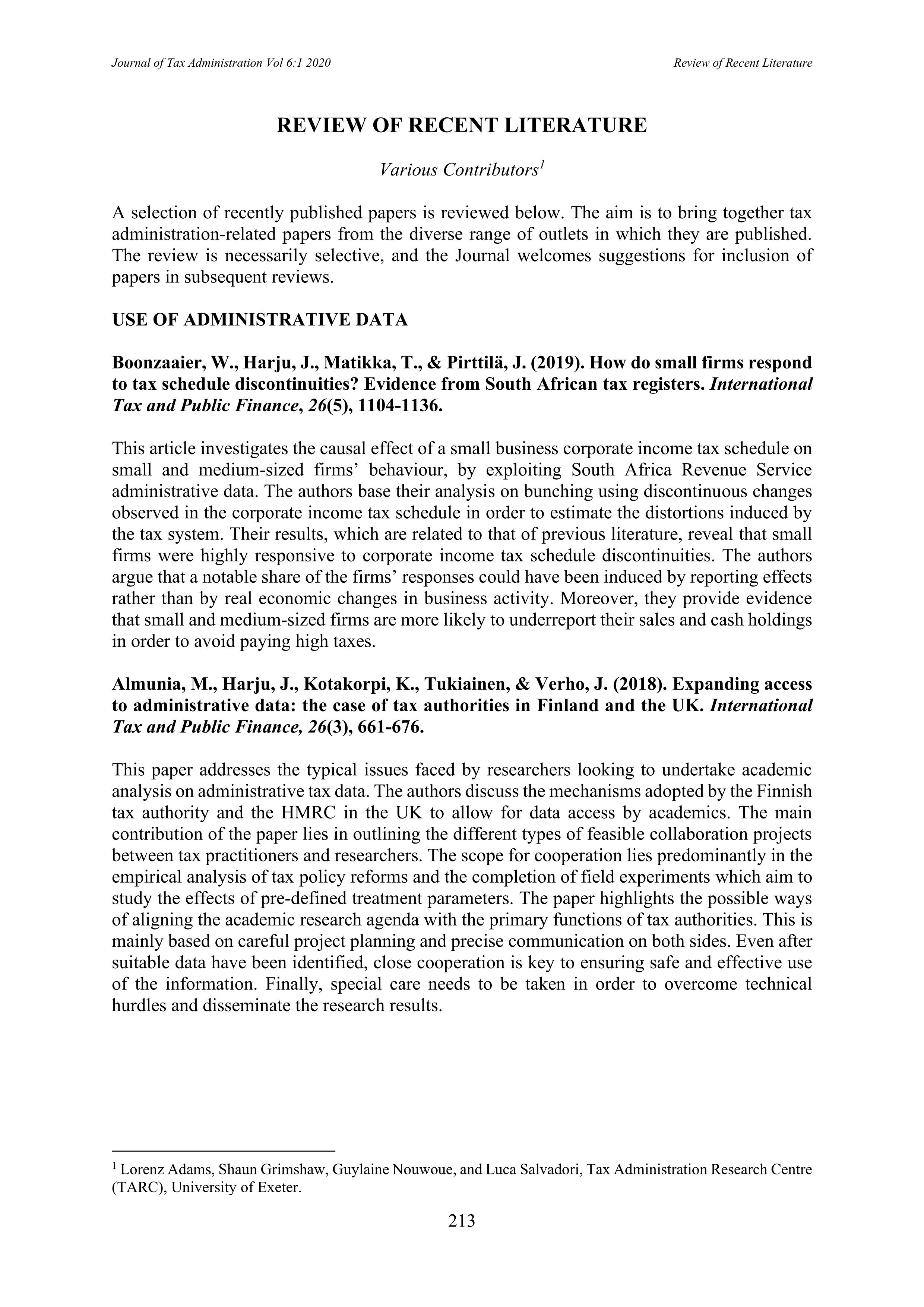Review of Recent Literature
Keywords:
Use of Administrative Data, Developing Countries, Non-Compliance: Underreporting, Corruption, Anti-Avoidance Rules, Tex Enforcement, Compliance: Nudges, Compliance Experiments, Audits, Tax Administrations, International TaxAbstract
N/A
References
Alm, J., Cifuentes, L. R., Niño, C. M. O., & Rocha, J. Can behavioral “nudges” improve compliance? The case of Colombia social protection contributions, Games, 10(4), 43. https://doi.org/10.3390/g10040043
Almunia, M., Harju, J., Kotakorpi, K., Tukiainen, J.,& Verho, J. (2018). Expanding access to administrative data: the case of tax authorities in Finland and the UK. International Tax and Public Finance, 26(3), 661-676. https://doi.org/10.1007/s10797-018-9525-0
Bird, R. M. (2018). Fiscal decentralization and decentralizing tax administration: Different questions, different answers. In A. Valdesalici & F. Palermo (Eds.), Comparing fiscal federalism (Studies in territorial and cultural diversity governance, vol. 10, pp. 190-220). https://doi.org/10.1163/9789004340954_011
Boonzaaier, W., Harju, J., Matikka, T., & Pirttilä, J. (2019). How do small firms respond to tax schedule discontinuities? Evidence from South African tax registers. International Tax and Public Finance, 26(5), 1104-1136. https://doi.org/10.1007/s10797-019-09550-z
Caldeira, E., Geourjon, A.-M., & Rota-Graziosi, G. (2019). Taxing aid: The end of a paradox? International Tax and Public Finance, 27(1), 240-255. https://doi.org/10.1007/s10797-019-09573-6
Casal, S., Grimm, V., & Schächtele, S. (2019). Taxation with mobile high-income agents: Experimental evidence on tax compliance and equity perceptions. Games, 10(4), 42. https://doi.org/10.3390/g10040042
Castañeda, N., & Doyle, D. (2019). Progressive tax policy and informal labor in developing economies. Governance, 32(4), 1-24. https://doi.org/10.1111/gove.12390
Chan, H. F., Dulleck, U., & Torgler, B. (2019). Response times and tax compliance. Games, 10(4), 45.
Chatzivgeri, E., Chew, L., Crawford, L., Gordon, M., & Haslam, J. (in press). Transparency and accountability for the global good? The UK’s implementation of EU law requiring country-by-country reporting of payments to governments by extractives. Critical Perspectives on Accounting. https://doi.org/10.1016/j.cpa.2019.02.001
Chirico, M., Inman, R., Loeffler, C., MacDonald, J., & Sieg, H. (2019). Deterring property tax delinquency in Philadelphia: An experimental evaluation of nudge strategies. National Tax Journal, 72(3), 479-506. http://doi.org/10.17310/ntj.2019.3.01
Christensen, R. C., & Hearson, M. (2019). The new politics of global tax governance: Taking stock a decade after the financial crisis. Review of International Political Economy, 26(5), 1068-1088. https://doi.org/10.1080/09692290.2019.1625802
Dabla-Norris, E., Misch, F., Cleary, D., Khwaja, M. (2019). The quality of tax administration and firm performance: evidence from developing countries. International Tax and Public Finance. Advance online publication. https://doi.org/10.1007/s10797-019-09551-y
Gatt, L., & Owen, O. (2018). Direct taxation and state-society relations in Lagos, Nigeria. Development and Change, 49(5), 1195-1222. https://doi.org/10.1111/dech.12411
Gunter, S. R. (2018). Your biggest refund, guaranteed? Internet access, tax filing method, and reported tax liability. International Tax and Public Finance, 26(3), 536-570. https://doi.org/10.1007/s10797-018-9528-x
Kukk, M., Paulus, A., & Staehr, K. (2019). Cheating in Europe: Underreporting of self-employment income in comparative perspective. International Tax and Public Finance. Advance online publication. https://doi.org/10.1007/s10797-019-09562-9
Lips, W. (2018). Great powers in global tax governance: A comparison of the US role in the CRS and BEPS. Globalizations, 16(1), 104-119. https://doi.org/10.1080/14747731.2018.1496558
Li, W., Pittman, J. A., & Wang, Z.-T. (2019). The determinants and consequences of tax audits: Some evidence from China. The Journal of the American Taxation Association, 41(1), 91-122.
Liu, C., & Mikesell, J. L. (2018). Corruption and tax structure in American states. The American Review of Public Administration, 49(5), 585-600. https://doi.org/10.1177/0275074018783067
Oats, L., & Tuck, P. (2019). Corporate tax avoidance: Is tax transparency the solution? Accounting and Business Research, 49(5), 565-583. https://doi.org/10.1080/00014788.2019.1611726
Ogembo, D. L. A. (2019). The Tax Justice Network-Africa v Cabinet Secretary for National Treasury & 2 others: a big win for tax justice activism? British Tax Review, 2019(2), 105-117.
Pissarides, C. A., & Weber, G. (1989). An expenditure-based estimate of Britain’s black economy. Journal of Public Economics, 39(1), 17-32. https://doi.org/10.1016/0047-2727(89)90052-2
Sandler, D., & Watzinger, L. (2019). Disputing denied downward transfer-pricing adjustments. Canadian Tax Journal, 67(2), 281-308. https://doi.org/10.32721/ctj.2019.67.2.sandler
Swanson, L. A., & Bruni-Bossio, V. A. (2019). A righteous undocumented economy. Journal of Business Ethics, 160(1), 225-237. https://doi.org/10.1007/s10551-018-3878-2
Titus, A. (2019). Designing a general anti-avoidance rule for the East African community – A comparative analysis. World Tax Journal,11(2), 291-300.
van Apeldoorn, L. (2019). A sceptic's guide to justice in international tax policy. Canadian Journal of Law & Jurisprudence, 32(2), 499-512. https://doi.org/10.1017/cjlj.2019.14
Wynter, C. B., & Oats, L. (2019). Knock, knock: The taxman’s at your door! Practice sense, empathy games, and dilemmas in tax enforcement. Journal of Business Ethics. Advance online publication.

Downloads
Published
How to Cite
Issue
Section
License
Copyright (c) 2020 Lorenz Adams, Shaun Grimshaw, Guylaine Nouwoue, Luca Salvadori

This work is licensed under a Creative Commons Attribution 4.0 International License.
Our open access status means that authors retain the copyright of their work. However, all papers published in JOTA are done so under a Creative Commons Attribution 4.0 International license (CC BY). This means that others can share and/or adapt your work without your permission as long as they follow certain rules, including attributing your work correctly.
You can learn more about this on our Open Access, Licensing, and Copyright Policies page.



